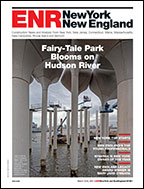The South African subsidiary of a Portuguese civil construction company has won a two-phase, $818-million contract to construct Bugesera International Airport in Rwanda under a build-own-operate-transfer model, with a view to turning it into central Africa’s premier air transport hub by 2018.
The airport, located 25 kilometers east of Rwanda’s capital, Kigali, was designed by U.K.-based TPS Consult in partnership with Nairobi-based GIBB Africa. Mota-Engil Africa aims to complete, in 2018, the terms of the first-phase contract, which the company signed on Sept. 1. With a planned capacity of 1.7 million annual passengers, the airport will complement Kigali International Airport.
Manuel Mota, Mota-Engil Africa's director, says work is set to commence in a few months. The Portuguese will finance, construct and operate the airport under a 25-year concession and have an option to extend the contract for another 15 years. A financial close for the project is expected on June 17, according to spokesman Luis Silva.
Mota-Engil Africa will construct passenger and cargo terminal buildings and a 4.2-km-long runway, which can handle Group 6 aircraft.
The contract also entails construction of a traffic control tower, airport rescue center and firefighting facilities.
The second phase, which will include construction of a second runway, is estimated to cost $400 million and will increase the passenger capacity to 4.5 million passengers per year. The timeframe for this phase is unclear. A Rwandan government statement said: “The choice of a Public-Private Partnership model for the Bugesera International Airport project, as opposed to Government borrowing money to put up the airport, was informed by the need to speed up the proposed facility’s development and to increase its profitability.”
The Rwandan government will own 25% of the Bugesera International Airport through Aviation Travel & Logistics Holdings Ltd., a holding company formed in June; Mota-Engil Africa will own 75%.
Silva says the new airport “is part of an ambitious investment program of the Rwanda government to establish Kigali as a tourist and business conference destination as well as the hub for Rwanda Air.”
Expansion of the existing Kigali International Airport is constrained by the hilly terrain around the airport and its proximity to the capital, Kigali.
The African Development Bank predicts that the medium-term growth of air traffic in the landlocked country will average 1.3 million passengers, 15,500 tonnes of cargo and 17,712 aircraft movements per year by 2025.



